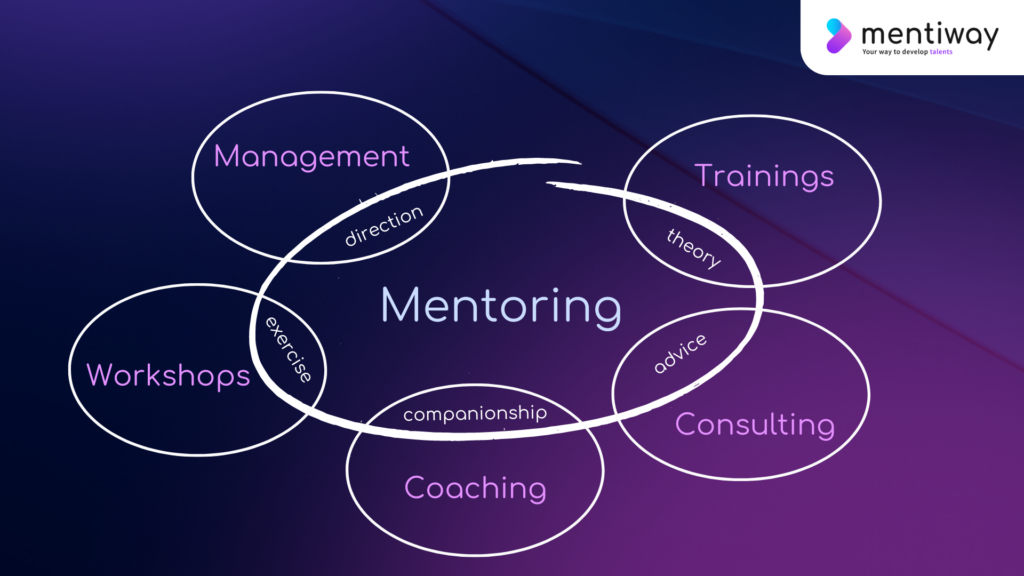Who is a Mentor – definition, competences, role and responsibilities
In today’s dynamic world, where education and professional development play a key role, the concept of Mentoring has become extremely important. Mentoring is a process that can significantly influence an individual’s development in both professional and personal spheres. Known for decades in the USA or the West in general, in Poland it is only beginning to gain importance. With more mentoring programmes being launched, the number of both Mentees and Mentors is growing. But who is a Mentor anyway?
In this article, we will explore a deeper definition of a Mentor, his/her role in the life of an individual and the key competencies that make him/her an indispensable support in the development process. We will learn about the character traits and skills that distinguish a Mentor, and the benefits they can bring to both the Mentor and the Mentee, i.e. the person being mentored. We will also examine the different aspects of mentoring, from the traditional corporate Mentor-Mentee relationship to the open forms of mentoring that are becoming increasingly popular. Let’s discover together who a Mentor is and why they are a key figure in today’s world of personal and professional development.
Who is a Mentor? – definition
A mentor, according to the definition, is ‘an experienced, wise advisor, teacher and educator’.
In the shortest terms, it is simply a person from whom one learns. The Mentor has some competence and experience in a particular field and the Mentee – i.e. the student – benefits from this experience by receiving the support, advice and help offered by the Mentor.
But again – as with the attempt to define mentoring – here too, one would have to consider defining Mentor through the lens of the actual learning processes present in the market and in personal and professional development more widely.
Hi, my name is Thomas. I am the Co-Founder of Mentiway. We are happy to share our knowledge and support organisations on their way to success! 💪 If you are interested in how to efficiently and effectively implement a mentoring programme in your organisation using technology:


Mentor and mentoring processes
The Mentor, by virtue of its role, does not exist in a vacuum. For a Mentor to exist there also needs to be a mentoring process involving the Mentee.
It is because of the types of mentoring process that we can classify the types of Mentors differently:
Formal mentoring processes
This is the most effective form of mentoring and therefore the most effective embodiment of Mentor. Such processes have a predefined structure. Among other things, during them, the specific development goals of the Mentee taken into account during the process are set at the beginning, and at the end, the two people in the pair assess the degree to which the goals have been met and determine the further development path. We wrote more about the comparison between formal mentoring processes and the informal relationship in a previous article.
Formal mentoring processes are usually available in the workplace, as dedicated open programmes or at universities. They most often begin with the recruitment of Mentors and Mentees, and then either the organisers pair up participants or it is the Mentees who select their Mentors from a pool of suggested proposals.
Informal mentoring
The definition of Mentor can also be seen through the prism of informal processes, in which it is most often the person with less experience who initiates the contact with the friend who has more experience in a given area. Mentoring in this case consists of several meetings, conversations during which the Mentee presents his/her challenges and the Mentor advises or shares his/her experience.
It should be noted, however, that this type of relationship very often takes on a consulting character or even goes in the direction of showing a specific way. In such a case, it ceases to be a mentoring process and the Mentor in practice becomes a consultant or even father/mother the Mentee, which usually does not end well.
Whatever type of relationship we enter into, it is very important to remember what the Mentor’s role is. It is definitely NOT to advise or judge, but rather to analyse, question and finally share your knowledge and experience. Anyway, there are many more of these roles in practice.
What does a Mentor do? – role in the process
A mentor has a number of different roles, which he or she should tailor to the specific mentoring process depending on the needs. The following roles can be considered as such a starting base:
- Companionship, or being in partnership with the Mentee. Often when we are a Mentor, we unconsciously step into the role of Guardian, wanting to help the Mentee solve problems, find solutions for him or her, protect her from mistakes. And this is not what mentoring is all about. The Mentor-Companion builds trust and security so that the Mentee has the space to grow, to build his/her own experience, to make mistakes.
- Support – Wanting to be supportive of the Mentee, the Mentor is non-judgmental and non-judgmental. Shows interest in the Mentee and in the topics brought to the mentoring sessions. Supports the Mentee in broadening perspectives, finding new solutions, changing the context. Provides encouragement and encourages full engagement in the process.
- Actively listening to what the Mentee has to say. Using paraphrases, clarification, reflecting feelings and summarising. All this in order to get to know the Mentee’s needs better, but also to give the Mentee the space to speak, which must be preceded by reflection on the subject, self-reflection, getting to know oneself.
- Asking questions often referred to as coaching questions – starting with open-ended questions, through value questions (on the Mentee side) and closed questions about the Mentee’s plans and aspirations. Some Mentors say that questions are the most important tool in their work. See more about questions in a mentoring process.
- Analysing and drawing conclusions and sharing these conclusions with the Mentee. In the process of working with a Mentee, the Mentor has access to a lot of data, both those collected from the Mentee and those that are the Mentor’s own resources. An important role of the Mentor is to be able to connect ‘many dots’ and draw conclusions that are useful to the Mentee.
- Sharing one’s knowledge and experience. When entering into a given mentoring process, the Mentor, by definition, has more experience and accumulated knowledge in a given area. It is the Mentor’s role to share these resources with the Mentee, but remembering to do so only after the Mentee has exhausted his or her ideas and both agree that there will be value in sharing the Mentor’s knowledge at that point.

What should a Mentor not do in the process?
To further define the Mentor’s role in the process, it is also worth considering what Mentors should definitely not do:
- Do not be critical or negative: The mentor should not criticise the Mentee in a demotivating or negative way. Instead, he/she should focus on constructive feedback and finding solutions.
- Do not impose solutions: The mentor should not impose his/her ideas or solutions on the Mentee. The essence of mentoring is to help the Mentee to think and make decisions independently.
- Do not ignore the needs of the Mentee: It is important for the Mentor to listen to and understand the Mentee’s needs, goals and concerns. Ignoring them can lead to mistrust and an ineffective mentoring relationship.
- Do not be unavailable: The mentor should be available and present within the agreed meeting times. Reliability and regularity of meetings are key to a successful mentoring relationship.
- Do not defend your status or power: The mentor should not use his/her position or power in a negative way. The relationship should be a partnership and not hierarchical.
- Do not break trust: Trust is a key element of the mentoring relationship. The mentor should not breach trust by sharing private information or using information provided by the Mentee inappropriately.
- Do not impose your lifestyle: the Mentor should not impose his/her lifestyle or values on the Mentee. He/she must respect the Mentee’s differences and individuality.
- Do not overlook personal development: Mentoring should not only focus on the professional aspects. It is equally important to develop the Mentee as an individual, helping him/her to deal with personal challenges.
- Do not forget the Mentee’s goals: the Mentor should keep in mind the Mentee’s goals and help him/her to achieve them. Regardless of the topics discussed in the meetings, the purpose of mentoring is to support the Mentee in achieving his/her goals.
- Do not be impatient: The development process can take time and change can be gradual. The mentor should not lose patience and motivate the Mentee to persevere.
It is important that the mentor maintains professionalism, empathy and respect in the mentee relationship, always guided by the well-being and development of the mentee. Avoiding the above-mentioned behaviours helps to create a positive and effective mentoring relationship that benefits both parties.
Mentor vs Coach
Here it is also worth noting the key differences between a Mentor and a Coach.
The differences arise primarily in the roles of Coach and Mentor. Namely, a Coach is a person with whom we learn, and a Mentor is someone from whom we can learn something. In other words, the Coach is supposed to inspire, to highlight the Coachee’s strengths. He or she is supposed to ask difficult questions, provoke thoughts, help to get out of the information bubble. The Mentor, on the other hand, also performs these tasks in part, but is above all a person who has experience in a particular area and shares it with the Mentee.
In addition, the Coach, by virtue of his/her role, must be trained and experienced in the subject of coaching. He/she should be certified and preferably have had as many sessions as possible. A mentor would also be good if they knew the relevant coaching techniques, but this is not required to be effective in their role.
The domain knowledge mentioned above is also a very important difference. The Coach does not need to ‘know’ the area in which he will be supporting the Coachee. When coaching, for example, in sales, the Coach does not need to be an outstanding salesman. It is sufficient for him/her to ask questions appropriately and guide the Coachee to develop in this area. The Mentor, on the other hand, should definitely have significantly more knowledge and experience than the Mentee in the subject in which the Mentee wants to develop.
Mentoring combines elements of coaching but supplements them with subject knowledge and experience. Among other things, the mentor during the session shows how he or she has himself or herself solved the problems that the Mentee is currently facing.
Key characteristics and competences of the Mentor
Anyone wishing to become a Mentor should consider whether they have the qualities and competences necessary to fulfil this role.
Among the prerequisites it is worth to mention:
- A willingness to help others. Being a Mentor is about helping and supporting others. It is necessary to take an interest in the other person, to want to support and to feel the satisfaction of helping the other person, of seeing them solve their problems and achieve their next goals.
- Availability. Mentoring is a process that engages on many levels. The mentoring sessions themselves last 60-90 minutes and a minimum of 5-6 sessions are needed for the process to be effective. Commitment is also needed between sessions – before – to prepare for them and after to self-reflect and think about what to do differently/better next time.
- Motivation. This trait is somewhat related to the desire to help others, but motivation can also come from other sources. It is worth reflecting (for example using the 5x Why technique) on why we want to become a Mentor and keeping this motivation in mind throughout the process.
- Knowledge and experience. Given the role of Mentor, it is also necessary to have knowledge and experience in the chosen topic – one that the open mentoring programme in question covers, or one that is desirable in a Mentee.
On the other hand, among the Mentor’s key competences we can distinguish:
- ability to set goals for oneself and others,
- giving constructive feedback,
- communication skills,
- active listening,
- asking questions.
If you have these qualities and competences, there is nothing stopping you from trying your hand at mentoring. And it is definitely worth it.
Benefits of being a Mentor
In addition to realising their own motivations, mentoring brings many additional benefits to Mentors. Here are some of the main benefits to look out for. However, this list is definitely not closed and there is something for everyone in mentoring:
- Developing leadership skills: Mentoring requires the ability to communicate, listen, motivate and lead. Through mentoring, the Mentor develops leadership skills that can be useful in both professional and personal life.
- Re-learning: The mentoring process forces the Mentor to reflect on his/her own experiences and knowledge. The Mentor must be ready to rethink his/her own decisions and actions and to learn anew.
- Summary and Clarity: Helping others to understand certain concepts or skills can help the Mentor to better understand the same concepts and increase clarity in his/her performance.
- Increased satisfaction and motivation: Seeing the Mentee achieve their goals and grow, the Mentor can experience great satisfaction and motivation. This can be a source of additional energy and passion for their own activities.
- Networking: Through mentoring, the Mentor can build valuable contacts and professional relationships. This can benefit you in the future in the form of new business or professional opportunities.
- Increased self-awareness: Mentoring requires an understanding of one’s own strengths and weaknesses and the ability to communicate with others. This helps the Mentor to increase their self-awareness and improve their soft skills.
- Sustaining a passion for the profession: Helping younger people with their professional development can remind the Mentor why they chose their career path and help them maintain their passion for their work.
- The perspective of the younger generation: Mentoring can provide the Mentor with a new perspective on today’s challenges and approaches of the younger generation. This can help you adapt to changing trends and market needs.
- Developing communication skills: Mentoring requires excellent communication skills. Practice in this area can help the Mentor to improve their ability to communicate effectively.
How to become a Mentor
We already know who a Mentor is, what key qualities and competences he/she should have and what are the advantages of participating in mentoring. The question then is how to become a Mentor.
The first method is simply to search for a list of open mentoring programmes in a search engine using queries such as ‘mentoring programme’, ‘mentoring recruitment’, ‘apply as a mentor’, etc. Of course, the recruitment period for most programmes is closed. Of course, the recruitment period for most programmes is closed and it may not be possible to join a programme at any given time. However, there is nothing to prevent you from registering for a programme and applying when a new programme opens.
The second option is to seek out and join one of today’s many industry organisations and foundations. These organisations very often organise mentoring programmes open to their participants in addition to their other activities.
Another method may be to suggest to your employer that you organise internal mentoring and apply to be a Mentor. Alternatively, you could look for a Mentee yourself – for example, by communicating your willingness to become a Mentor on the company intranet.
In addition, there are also a number of mentoring schools on the Polish market where you can gain initial knowledge and even become certified in mentoring at a later stage. This can be a certain alternative or complement to participating in first mentoring processes.
Hi, my name is Thomas. I am the Co-Founder of Mentiway. We are happy to share our knowledge and support organisations on their way to success! 💪 If you are interested in how to efficiently and effectively implement a mentoring programme in your organisation using technology:








